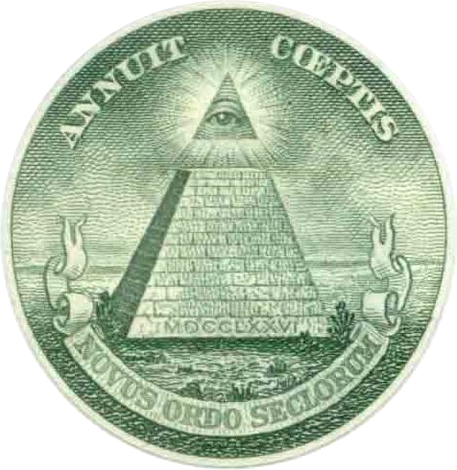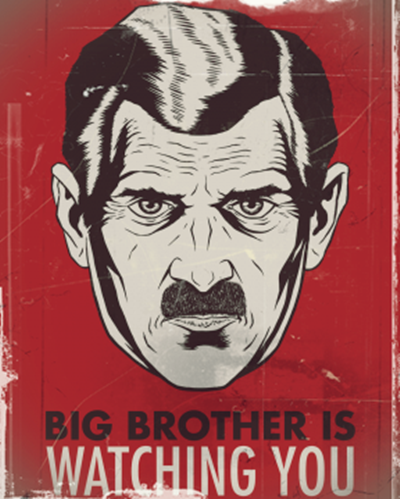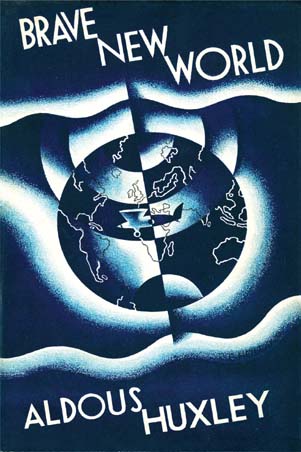
A month theme of independence and its villainous opposite, dystopia, wouldn’t be complete without an examination of two classics in the genre of warped worlds: Brave New World by Aldus Huxley and 1984 by George Orwell. Both are stark worlds that offer a vision of what our life could be like if we swung to one of extreme of the spectrum or the other. In Brave New World, people’s pleasures keep them peaceful and pliable. In 1984, people’s pains and persecutions keep them plowed under. Toys vs torture. They can both work.
What’s similar about the books is that – SPOILER! – the villains win. Though the protagonists struggle wholeheartedly, face trials, and gain allies, they can’t fight city hall…especially when city hall is about to put a cage of starving rats on the hero’s face. The power of society, not just the government, proves too much for the protags, who perish in body, soul, or both. Villainous victory isn’t something we see often. Heck, you’re about as likely to see unicorns in a Tom Clancy thriller as you are to see the villain win. Never mind that villains are almost always more powerful, cunning, and capable than the hero.
This terrible triumph alone is worth looking at, independence/dystopia aside. Ready?
Onward!
Nineteen Eighty-Four

The classic dystopian world! And oppressive, tyrannical government keeps its citizens under its jackboot heel. Resistance is building, but things aren’t what they seem.
Inciting event: Nuclear war
Dystopian world structure:
Three superpowers: Oceania, with its Ingsoc (English Socialism) ideology, includes Western Hemisphere, the British Isles, Australasia, and Southern Africa.
Eurasia, Neo-Bolshevism, and including Continental Europe and Russia, including Siberia.
Eastasia, with “Death worship” ideology, is unsurprisingly China, Japan, Korea, and Indochina.
Oceania is the country of our protag and by extension our villains. Its society includes three parts:
(I) Inner Party, the elite rulers, 2% of the population.
(II) Outer Party, middle class, 13% of the population.
(III) Proles (from proletariat), low income with no education, 85% of the population.
The Party rules the government and has instituted four main branches:
Ministry of Peace for the perpetual war with the other superpowers
Ministry of Plenty for rationing and starving the populace into submission
Ministry of Love for torturing and brainwashing dissenters
Ministry of Truth for editing the news, entertainment, education into propaganda
Freedoms: Free from thinking, using common sense, using discernment, voting, taking action against evil, trusting others. Free to turn in people for dissent.
Origin of dystopian rulership: Need for stability, desire for power. Nuclear war provided instability, during which the Party took power. It keep society stable but in stagnation as it rules with an iron fist.
Summary/synopsis: Winston Smith is our protagonist. He’s middle class, Outer Party, which means he’s quite restricted in what he can say and do. The Inner Party lives fairly free lives as long as they toe the line. The lower class paradoxically have freedom to think and speak because they’re judged too dumb to make good use of said freedoms. The middle class, the Party believes, is the instigator of rebellion, while the lower class is just white noise.
Winston works in the Ministry of Truth, or the Minitrue, editing any media that contradicts the Party line at the time. He has memories of a time before the Party and its leader Big Brother. He’s not disloyal, he just begins to…think and question. Gasp!
Then he runs into Julia, a woman who seems to be in the Brotherhood resistance. Enter: love interest.
He also meets a O’Brien, who will become the main antagonist of the book. That means he’s also the most interesting character! He’s a senior member of the vaunted Inner Party. He gives the Party a face, other than the dark eyed, mustachioed Big Brother. In his words and actions we receive a glimpse of what those who perpetuate totalitarianism and support tyrants believe.
Like any good antagonist or villain, he is the hero of his own story. While on the surface he appears to be a “normal” Inner Party member living in relative comfort (still not up to our standards though), he’s actually a member of the Thought Police. This agency hunts and arrests thought-criminals – any person they suspect thinks something unapproved by the Party. This is his calling, his niche, and he’s bloody good at his job.
The Thought Police don’t wait around for a resistance to form; they make a false-flag group to trap the “weak sisters” who aren’t 110% committed to the Party. O’Brien works in this sting. His grasp of human psychology is impressive, though it ends at the brink of sanity. More on that later. His cunning and his ability to read people help him cultivate a friendship with Winston. Winston doesn’t suspect a thing. O’Brien invites him and Julia to O’Brien’s flat, which is comfortable by their standards. There the would-be rebels swear allegiance to the Brotherhood. (hey, nobody accused them of being smart.) Little do they know they’re signing their own arrests warrants.
When O’Brien first comes to Winston in prison after Winston’s arrest, O’Brien states, “They’ve got you too!” Then he adds, “They got me a long time ago.” We don’t know if he was like Winston at one point or if he just means they won his complete loyalty many years ago. I would love to see a book about O’Brien’s back story. Guess I should look around fanfiction.net.
Winston interests O’Brien. O’Brien says Winston’s mind is like his except that Winston is insane. Makes about as much sense as anything in this society… In an effort to “cure” the insanity, O’Brien employs electroshock on Winston. It’s torture, plain and simple, but O’Brien is convinced he’s helping this poor creature come to the glorious realization that there is no reality apart from the Party.
This also reveals how completely convinced O’Brien is of the Party’s legitimacy. He says the cure for the “insanity” of seeing reality as it is is simple: believe that reality is whatever the Party says it is. This becomes part of the torture O’Brien inflicts on Winston. “2+2=5” is the phrase they drill into Winston’s head. This is a reference to a part of USSR’s plan for world domination, but here it is an example of how the Party ignores reality even when it’s standing right in front of them. The Party is a master of controlled manipulation of perception. People accept its truth because…it’s easier than getting tortured to death. Instead they choose to die as prisoners of a different sort.
O’Brien explains that the Party just wants power for power’s sake, victory for victory’s sake. It’s addicted to the thrill.
Under torture/treatment, Winston confesses to crimes he never committed but that O’Brien says he has. But that’s not good enough for O’Brien. The cure eludes him! What could be the last straw to break Winston’s will? Betrayal of Julia, his love.
Goal in sight, O’Brien brings Winston to Room 101, where prisoners face their worst fear. O’Brien uses a cage of starving rats and the promise to leave it on Winston’s face to extract a confession that Julia is guilty of treason. “Do it to Julia too!” he screams.
Ah, eureka! Now O’Brien has the cure he wanted for poor deluded Winston. When we see Winston again, he’s back in society, but he’s changed. When he sees a crowd celebrating a supposed Party victory in the never-ending war, he sees himself as one of them. In relief Winston feels he has ceased his “stubborn, self-willed exile” and accepted the love of Big Brother. We end with Winston looking lovingly at a portrait of Big Brother.
Thus he has traded independence for other comforts: The approval of the group. The lifting of the mental burden of striving against an insane system too big to shift. The safety of toeing the line. He feels the comfort of complete surrender and loss of will. It’s a lobotomy of the will.
At last Winston sees what O’Brien has been trying to shock into his brain: Freedom is slavery. Slavery is freedom.
Pro tips for dystopian dictatorships:
Leave no evidence! Change history to suit you.
If you say a lie enough times, people believe it.
People will believe anything, given the proper motivation.
Use dissenters as examples.
Don’t let dissent grow.
Keep communication controlled. Control the language and you control the thoughts.
It’s easier to follow the rut than buck the system.
People will avoid pain and discomfort at all costs.
People will tolerate and even support evil as long as those they consider to be their rulers say it’s okay.
Brave New World

O wonder!
How many goodly creatures are there here!
How beauteous mankind is! O brave new world,
That has such people in’t.
— William Shakespeare, The Tempest
Shakespeare’s Miranda gushes after seeing men betraying each other and generally being unsportsmanlike and uncivilized. Irony, irony everywhere. And that sums up Brave New World.
Inciting event: Humanity’s need for stability.
Dystopian world structure: Ten World Controllers head the benevolent dictatorship/oligarchy. The populace is conditioned to serve the state and remain peaceful thanks to artificial wombs (jars, basically) and brainwashing since “birth.” The society is broken into classes: Alpha (intellectuals) through Epsilon (stunted slaves). An individual’s place is assigned before conception and ensured via adding alcohol to the womb jar if a lower grade human is desired.
There are a few “reservations” where people maintain the old order of giving live birth and valuing life.
Critical thinking, moral standards, and initiative are discouraged, but pleasures and luxuries are encouraged. Have sex with whoever you want as much as you want, get high off Soma, ride the theme parks (bumblepuppies), go to the movies (feelies), but don’t start wondering about the purpose of life.
Consumption of goods is encouraged to keep the economy humming. Newness is more important than intrinsic value, and classics in art and music must be suppressed to make room for the new. Struggles and accomplishment are obsolete, traded for social stability.
Hedonism is the state religions, the letter T (Model T) has replaced the cross, and the name Ford (as in Henry Ford) is used instead of Lord.
Freedoms: Pleasure all you want! Free to consume, be narcissistic, have sex wantonly, waste time, get high, die through euthanasia, have orgies, be shallow, be hedonistic, live in comfort, avoid critical thinking.
Origin of dystopian rulership: Need for stability, desire for power.
Summary/synopsis:
Lenina Crowne and Bernard Marx work in London at a “hatchery” where human embryos are raised into infants in jars. Lenina works in the hatchery, and Bernard is a psychologist in the Directorate of Hatcheries and Conditioning. She’s content and in the in crowd. He’s short and pissed off. His specialty is hypnopaedia, a form of hypnotism/brain washing used on people while they sleep. As such, he knows how society is sustained but disapproves of it. Amazingly, he makes no secret of it. But his ideas and vertically challenged condition lead to mockery from the other Alphas.
Eventually he and Lenina go to a Savage Reservation in New Mexico. The residents live like modern American Indians on a rez. While there, they meet Linda, a woman who also visited the village on holiday but became separated from her group. She stayed and had a son. This is a huge shame to those in the civilized world who look on parenthood as an abomination. The words Father and Mother are considered vulgar terms and the height of insult. I always said the F bomb would lose its punch if we used it too much!
The child’s father was a fellow vacationer. Turns out that fellow is Bernard’s boss at the hatchery. Not one to miss a chance, Bernard takes Linda and her adult son John back to London. Linda will confront the father of her son, while John will explore “the brave new world.” What could go wrong!
Lots. Neither newcomer finds acceptance. Linda drugs herself out permanently with Soma, while John becomes a celebrity in the freak-show variety. His notoriety doesn’t last long, as society loses interest. He responds by trying to help the people. First he tries to disrupt a Soma distribution, as he sees its true nature. To his surprise, the recipients are enraged. Not sure why he’s unfamiliar with drug culture if he’s from a rez.
Then he, Bernard, and Bernard’s friend Helmholtz try to stir up a revolt among the put-upon low caste. What they would do if it succeeded is beyond me. It fails miserably, with the low caste turning on them when the hypnopaedic recordings are played over the loudspeaker.
The police apprehend the troublemakers and bring them to…Mustafa Mond’s office. He’s one of the Ten World Controllers. He’s the face of the Brave New World. He’s the interesting one here, as he explains the thinking behind the State. He’s named after Mustafa Kemal Atatürk, the founder of Turkey who pushed it to modernisation and secularism; and Sir Alfred Mond, founder of the Imperial Chemical Industries.
The following chapters involve the philosophical discussion he has with John.
We don’t know much about Mond’s past, but it’s probable that he was a scientist who used the scientific method. The method is outlawed now, as it’s the search for truth. That search is deemed to cause strife and thus be opposed to the happy peace of the world. Ironic, since science is a part of their religion. Actually, no one has training in science, though they’re taught to revere Science.
We also don’t know how he rose to power. He’s above the laws of the land, wielding complete power. Yet he remains a quiet, calm, restrained man. It’s not clear if he actually believes what he’s telling John, or if he just knows it’s what keeps the status quo, including his power.
He says that newness and consumerism with instant gratification keep the peace and make people happy. Old, classic things promote thought and slow down consumerism.
Things we value today such as motivation and intellect cause pain, he says. Most people will spend their lives doing boring things, so why not make them stupid in the first place so they don’t care? It’s a mercy. It also keeps stability in society. On the other hand, science must take a back seat to keeping people employed. You can’t replace too many people with machines, because what would the people do?
Mond relates an experiment where Alphas populated an island. They soon fell into civil war because the didn’t agree with how they divided the work.
He explains to John that certain things must be sacrificed to ensure “happiness” and “stability.” Those sacrifices include feelings, passions, commitments, and relationships. They cause strife. He believes that feelings and passions arise from arrested impulses. And of course restraint means unhappiness, right? Right?
We already saw how equality (not being forced to be a low caste), truth in science, classic art are sacrifices too. In fact, anything deemed a struggle must fall away. How can you be happy if you’re facing difficulties? How will we keep stability if we have to go through tough times that make us anxious?
Mond is a persuasive speaker, but not enough to convince John. The Savage goes to an abandoned lighthouse and eventually kills himself when people won’t leave him alone. Bernard and Helmholtz are exiled. Bernard is horrified, but Helmholtz enjoys it.
Mond remains World Controller, presiding over a stable, happy populace of idiots and narcissists who profess the tenets of hedonism and bow before the T in the name of Ford.
Such a happy ending!
Pro tips for dystopian dictatorships:
The Romans had it right: bread and circuses keep people under your power.
Luxury can be a chain as much as torture is, but it’s one made of gold and covered in gems and velvet.
Be careful what you let rule you.
Pleasure is addictive and brings its own pain, but we numb it with more pleasure.
Struggle in life may cause strife, but it makes us mature human beings.
People will by the majority rule choose the easy route, even if it means slavery.
People don’t realize they’re cattle if you keep them fed and entertained.
Free drugs are awesome.
So is Six Flags, Disney, Universal, Busch Gardens…the bumblepuppy and the feelies.
Creating your minions to be idiots works sometimes, so long as you have some intelligent people watching them.
Too many intelligent people in one place will cause revolution.
The best way to keep order is to make people want to keep the order.
You can’t induce a happy, content people to revolt, especially when they’re brainwashed.
Promise safety and stability and people will bow down before you, giving up all freedom.
Torture and toys are both viable tactics to control the populace. Do you see any similarities between the books we looked at and our world? How about the villains and our leaders? How free are you, and how secure is that freedom? Only you can answer. Oh, and don’t say too much in front of your electronic devices. Big Brother is watching.
Further reading:
Dystopian freedom: Learn to love the bomb
Villainous independence: More than fireworks
Villainous opportunism: How to take advantage of every opportunity, Albert Wesker-style
Agree? Disagree? Let us know in the comments.
Perform your own villain assessments with the Villain Matrix. Use the Villain Matrix spreadsheet that comes free when you join the Research Team, where you’ll also get our newsletter with its exclusive updates and content.